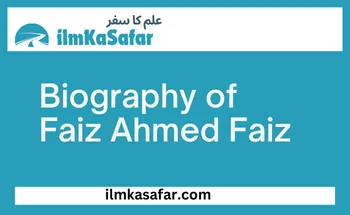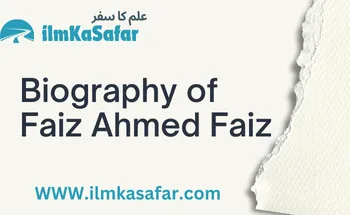Table of Contents
Breaking Boundaries of the Bold Legacy of Faiz Ahmed Faiz

Faiz Ahmed Faiz, one of the greatest and favorite poets of Pakistan, was born on 13 February 1911 in Sialkot, Punjab India now in Pakistan. He was born in a culture enriched family in the influence of scholars and literature. His father, Muhammad Sultan Khan, was a successful lawyer and a great lover of poetry and philosophy; He introduced young Faiz to poetry, philosophy as well as languages. It thus did not take time before young Faiz developed an interest in literature from his grounded cultural background.
Education
Scotch Mission High School in Sialkot was the first school that Faiz attended; it was a prestigious school that kinda set a thirst for knowledge in the young Faiz. These traits made him to enroll to further education at Government College, Lahore where he was to acquire his degree in English literature. After that, to build up the Aligarh part, he went to the Oriental College at Lahore and majored in Arabic language and literature. Faiz received education in both Eastern literary and Western—his poetry influential and representative of both classical and modern styles.
Career Beginnings
Faiz began his profession as a teacher, learning-process and teaching English and British literature M.A.O. College, Amritsar and, the Hailey College of Commerce Lahore. This kind of academic environment was beneficial to him to develop his intellectual capacity as well as establish himself in the literary realm. At the same time, Faiz also started doing editorial work and collaborated in, and was also a part of, different literary journals. Thus being an editor, he got in touch with other writers which fueled his passion to write in order to address some social issues.
It is important to attend political activity and be imprisoned.
During the 1930s he became member of Progressive Writers’ Association, which was that time a literary and social movement, a campaigning organisation for problem oriented progressive writers of British India. The movement was marxists in its orientation something readily sympathetic to Faiz ahmed faiz with his socialist views on fairness and justice. He virtually emerged as a leading Marxist philosopher in South Asia whose works are founded on aspects of class struggle, colonialism resistance as well as human dignity.
In 1951, Faiz ahmed faiz was implicated in the Rawalpindi Conspiracy case a plan to overthrow the government of Pakistan. He was once imprisoned and it was a sorrowful part in his life, but incarceration shaped his books. It was in the past decade that he wrote some of his moving poems with snapshots of defeat, endurance, and optimism. New experiences that he came across when as in prison enhanced his passion to fight for the oppressed and to also develop more energy to fight for a change.
Literary Contributions
It is also worth to state that the literary work of Faiz ahmed faiz is enormous and became priceless. The book ‘Naqsh-e-Faryadi (The Lamenting Image)’, ‘Dast-e-Saba (The Hand Of The Breeze)’, and ‘Zindan-Nama( The Prison Journal)’ is his poems containing love, freedom, and justice messages. The main unifying feature of Faiz’s written work includes its aesthetic and somber notes. It is important often to note that his work gave the philosophical foundation of the local classical Indian music particularly in the Urdu poetry tradition as he fused romanticism to contemporary political themes.
The great romanticist of the subcontinent, Faiz ahmed faiz, practically divided his creations into two categories; on one hand, he wrote about love and on the other, he wrote about justice. His poetry is not a grieving of social ills in society; it is a call to stand up, fight and hope. His speeches enunciate the needs of the suppressed and oppress the follies of the society and that’s why he is the poet and the rebel.
Later Years and Legacy
Faiz ahmed faiz had the opportunity to win many national and international awards for his literature and other social services. Some of the noble laureates included the Lenin Peace Prize, which was awarded to him in 1962 for advocacy for consideration of peace, justice, and human rights. He went on to write more, teach, and nurture the newest generations of poets, and activists until his death on the November 20, 1984.
In respect of the contribution that Faiz ahmed faiz has made to the Urdu literature and the South Asian culture, it is profound. His works are analyzed, hailed and even chanted in schools, meetings especially protests and are read more to this day as a torch bearer of justice and truth. I believe that reading Faiz’s poetry one may feel similar to the energies of another country, regardless the difference in language and traditions. Today his words are fresh, they even sound contemporary and in them there is strength and hope for the fight for justice in this world, individual and collective fight through art.
Conclusion
Kahlil Gibran, the worldwide literary genius still lives through his work and in the conscience of the people who still refer to his predecessor Faiz Ahmed Faiz legal justice. Yearly conventions, releases, and observances maintain him relevant and heard all through the yr. His poems are love and resistance poetry which are full of good moral values encouraging compassion, justice and overcoming of hardships.
For more Urdu Literature Visit our Website
Get All type of educational Material for Study Visit this Website.


